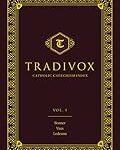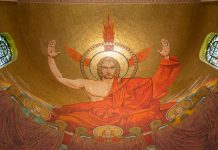His mercy is for those who fear him from generation to generation (Lk 1:4).
Once again on this third Sunday of Advent we encounter the figure of John the Baptist, “the voice of one crying out in the wilderness, ‘Prepare the way of the Lord; make straight His paths.'” In the Liturgy of Advent John bears witness to the Messiah through his call to repentance; an invitation that is ancient and ever new, and ever relevant. Just as important as the message, however, is John’s attitude towards the message. We are familiar with the famous saying: the medium is the message. The greatness of John the Baptist lies in his humility and self-effacement; these were both his medium and message for the Saviour to whom he gave testimony in meek and humble of heart. Of the Saviour the Prophet Isaiah said, “He will feed his flock like a shepherd, he will gather the lambs in his arms, he will carry them in his bosom, and gently lead those that are with young” (Is 40:11).
John the Baptist is set before us as a model for our own Christian commitment and proclamation, individually and collectively and especially liturgically; for it is in the sacred liturgy that Christ is both proclaimed and received. Here we come to hear the proclamation and to be formed by divine teaching. The celebration of the Mass is both the school and feast of faith and this medium also is the message. Christianity is a religion principally and fundamentally concerned with adoring, loving, and serving the one true God, in which man’s salvation and the very content of love of neighbour consists. Christianity is inherently bound up with sacrifice and sacrament, by which we profess our faith in God and give ourselves to Him in love. Here we endeavour to worship in spirit and in truth. The liturgy of the Church is the true worship of the true God through which we seek union with God—a mystical marriage with Him; and this is brought about through the Church’s prayer, especially the Holy Sacrifice of the Mass. Apart from this way of life, a life centred on the worship of God in the sacred liturgy, there is error, folly, despair, horror, and destruction—the whole history of fallen mankind, which wages war against the Lamb of God to whom John the Baptist gave testimony.
Our conscious and active participation in the Church’s sacred worship enables us to appropriate both the medium and the message; and so we endeavour to “live justly and devoutly in this age, as we await the blessed hope and the coming of the glory of our great God” (Tit 2:12-13). If we respond to the invitation to repentance with humility and make every effort to divest ourselves of all that is not of Christ we too “will testify to the light, so that all might believe” (Jn 1:6). With Our Lady we must make our own the words of the Magnificat which in today’s liturgy is the text for the Responsorial Psalm: “My soul magnifies the Lord and my spirit rejoices in God my Saviour, for he has looked with favour on the lowliness of his servant.” Humility is coupled with joy. Indeed, joy is the overwhelming tenor of the liturgy on the third Sunday of Advent, known also as Gaudete Sunday. Gaudete is Latin for Rejoice, the first word of our Entrance Antiphon: “Rejoice in the Lord always; again I say, rejoice.” Indeed the Lord is near.
Both Our Lady and St. John were intimately bound to the Mystery of Salvation as this Mystery was revealed. Both of them teach us by word and example the importance of humility vis-à-vis the Saviour. In the course of His ministry Our Lord would say of John: “I tell you, among those born of women none is greater than John; yet who is least in the kingdom of God is greater than he” (Lk 7:28). He says this not to undermine John in any way, but to affirm that even the least of us has an important part to play in the unfolding plan of Salvation. The Prophets looked forward to the New Covenant but did not share fully in its blessings. We however are established in it and so with full conviction we declare that indeed the Lord is near.
“My soul magnifies the Lord and my spirit rejoices in God my Saviour, for he has looked with favour on the lowliness of his servant.” These words are recited every evening in the Divine Office. It is the prayer of the Church that in imitation of our Lady and St. John endeavours to place no obstacle before God’s gift of grace. It is the prayer of those who seek to be clothed with the garment of humility (cf. 1 Pt 5:5); the humility of John and Our Lady, the humility of Our Lord Himself who “came in flesh, to show Himself living in flesh; and His humanity appeared that we might know His kindness” (St. Bernard of Clairvaux).
As we prepare spiritually for the Feast of Christmas let us foster in ourselves a spirit of reverent humility; for by it and it alone is the saving work of God accomplished in us and through us for “His mercy is for those who fear him from generation to generation” (Lk 1:4).










